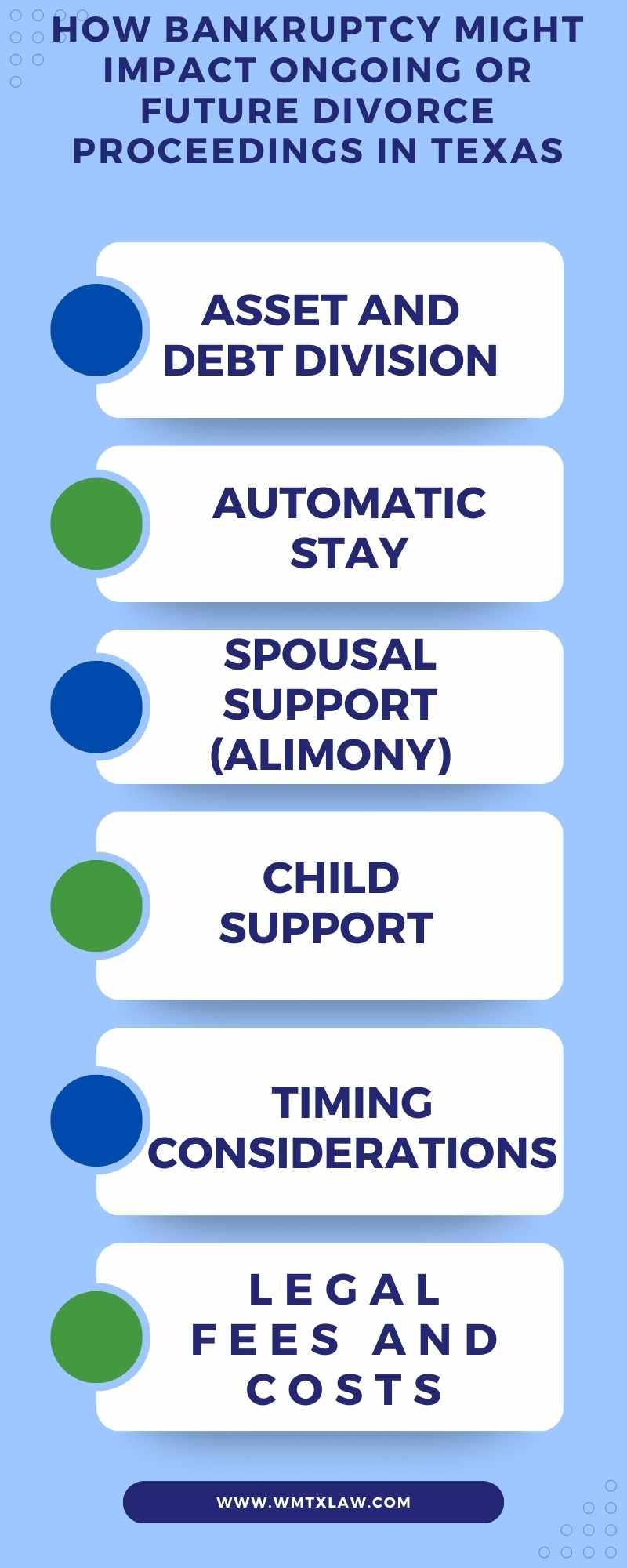As an attorney specializing in both family law and bankruptcy, I often encounter cases where financial issues intersect with marital problems. Elise had already let me know she was separated from her husband and might need representation if they were to decide to formally get divorced. Then an even more complex situation developed. Her estranged husband had filed for Chapter 7 bankruptcy causing her to call me again.

“Chris, I don’t know what to do,” Elise said, her voice trembling with distress. “I know we are still married in the eyes of the state, but practically, we’re living separate lives, and he’s decided to just go ahead and file for Chapter 7 bankruptcy. What does this mean for me?”
Elise explained that financial problems were a significant part of her marital issues. She was worried about how her husband’s bankruptcy filing would affect her, both legally and financially. She wondered if his filing for bankruptcy potentially could alleviate some of their financial strains and possibly save their marriage. Also, she questioned whether it would complicate things further.
“Elise, all of your thoughts here are common and understandable,” I reassured her. “You have a lot of options. Please let me supply some information and then we can apply it to the specifics of your situation.”
Separating from your spouse like Elise is rarely easy, and it becomes even more complex with bankruptcy involved. How does Texas law manage this situation? Will it impact the potential divorce settlement, asset division, debt responsibility, or shared financial obligations like child support?
This article focuses on how Texas law comes into play when a separated spouse files for Chapter 7 bankruptcy. We will be focusing on your rights, potential challenges, and steps you can take to protect yourself during this challenging time.
Understanding Chapter 7 Bankruptcy and its Implications in Texas

Chapter 7 bankruptcy, also known as “liquidation bankruptcy,” allows individuals struggling with significant debt to get a fresh financial start. In a nutshell, the legal process involves selling non-exempt assets to repay creditors, while any remaining eligible debts are generally discharged by the court providing financial relief.
How Chapter 7 Bankruptcy Filing Works
The process starts when an individual, in this case, your separated husband, files a petition with the bankruptcy court. This petition lists their assets, liabilities, income, and expenses. Next, a court-appointed trustee will review these financials and oversee the administration of the bankruptcy case.
Remember, in this instance, although separated, you are still legally married, and the bankruptcy filing impacts both partners, even when only one spouse officially files. Although you’re separated, Texas law often still treats your debts and assets as jointly owned until a final divorce decree is issued. This is important to keep in mind as you are going through this process. It could affect how you file taxes and many other things in your day-to-day life.
Key Considerations When a Separated Husband Files for Chapter 7 in Texas
In situations where couples are separated in Texas, and one spouse files for Chapter 7 bankruptcy, the legal issues often center around how the bankruptcy might influence ongoing or future divorce proceedings.
Here are some critical areas that require special attention:
- Asset and Debt Division: Texas is a community property state. This means assets and debts accumulated during the marriage are generally considered jointly owned, regardless of whose name is on the title or account. If an asset is sold during the bankruptcy process, the proceeds could be used to repay creditors, which can significantly impact your financial standing, even as a separated spouse.
- Child Support and Alimony: The good idea news is, child support and alimony obligations are not dischargeable in bankruptcy. That said, a bankruptcy filing can still complicate payments. While you’ll likely receive these payments, a Chapter 7 filing may affect your ex-spouse’s ability to stay current if their income changes due to the bankruptcy. How a spouse’s income is affected can vary from case to case. Open communication with your attorney can help navigate these challenges and ensure that child support obligations are met.
- Automatic Stay: When a Chapter 7 petition is filed, an “automatic stay” halts most creditor actions against your separated husband, such as lawsuits and wage garnishments. However, this stay might not extend to you if you are not also a filer. Understanding this stay’s nuances is vital, and your attorney can help clarify your obligations and protect you from potential complications.

It’s important to understand how one spouse filing separately for bankruptcy affects both parties. Only the filing spouse’s debts are included, which might benefit a spouse with significantly more debt. Consulting a bankruptcy lawyer can help determine if this is the right choice.
Related Guide: Should I File Bankruptcy Before or After Divorce in Texas?
Navigating Chapter 7 and Separation: Essential Steps to Protect Yourself
A separation coupled with Chapter 7 bankruptcy requires careful planning and assertive action to protect your rights and financial well-being. Here’s what you can do:
1. Consult With an Experienced Texas Bankruptcy Attorney
The moment your separated husband files for Chapter 7, contact an attorney specializing in both bankruptcy and family law in Texas. This step is critical. It ensures you receive sound legal advice tailored to your situation and allows you to understand the potential impact on your divorce proceedings. Your attorney can help protect your rights and achieve the best possible outcome in both your divorce and the bankruptcy case.
2. Determine Your Best Course of Action
After consulting your attorney and gaining a clear understanding of how the Chapter 7 filing affects your financial landscape, you can then determine how to proceed.
Several options exist that you can discuss in-depth with your attorney:
- File Chapter 7 Bankruptcy Yourself: This might be a strategic approach if you are also struggling with significant debt. Make sure you speak to a local bankruptcy attorney before making this decision. This is one of the many bankruptcy options an attorney can walk you through.
- Reaffirm Certain Debts: A reaffirmation agreement is a legal contract between a debtor and a creditor, where the debtor agrees to remain liable for a specific debt despite the bankruptcy discharge. You might choose this route for specific joint debts you wish to keep, such as a mortgage on a marital home. Sometimes these debts are unsecured debts that have gotten out of control, such as credit cards.
- File an Objection to the Bankruptcy: You may pursue this action if you believe your separated husband’s filing isn’t legitimate or if it was filed in bad faith. This could be because of a number of reasons, such as hiding assets or lying on the bankruptcy forms.

As a legally married couple in Texas, even though you are separated, you should file a joint petition for bankruptcy. There are many reasons why this might be a good idea, including that it can save money on filing fees, it can simplify the process by dealing with one case instead of two, and you could potentially receive a broader discharge of debts. Be sure to consult with a bankruptcy attorney to get legal advice specific to your situation.
Separated and Husband Filed Chapter 7: Protecting Your Future in Texas
Filing for bankruptcy is a legal process. As a separated spouse, you need a legal advocate who understands the intricacies of Texas law as it applies to this scenario. With a legal advocate, you gain control and hope even during challenging times like a separation and Chapter 7 bankruptcy.
Conclusion
Navigating the intersection of separation and Chapter 7 bankruptcy proceedings in Texas is undeniably complex. Each case varies based on unique factors like assets, debts, prenuptial agreements, and financial goals. Early legal counsel can guide you, provide clarity, protect your finances, and help you achieve a stable and independent future.

Could This Chapter 7 Filing Save Elise’s Marriage?
“Do you think that if the pressure of the debts came off of us, perhaps we might stop fighting?” she asked me.
“Elise, that’s for you to explore with yourself and with your husband,” I told her. “I can only suggest, yes, it’s possible. Marital discord often intensifies under financial pressure. Maybe he is thinking the same thing and that’s why he filed. Perhaps he was advised that filing for bankruptcy could save his finances and his marriage.”
“Well, I’ll need to sleep on that one, but I am open to the possibility,” she said. “Maybe our marriage could be saved without the pressure of paying off all this debt.”
“Elise, there are marriage counselors or mediators who can address both financial and personal issues, possibly leading to reconciliation,” I advised her. “Yes, sleep on it, and see if you want to reach out to your husband to explore if his Chapter 7 filing might be an attempt at reconciliation. But also remember, I am here to help you guide you if you decide to get a divorce. I know exactly how to manage the bankruptcy component if you decide to formally split up. Either way, I’ll be here for you.”
“Thank you, Chris. I feel much better knowing I have you on my side,” she said.
Schedule a Consultation with our North Texas Firm to Learn what you can do when your Separated Husband Files for Chapter 7
A marital separation combined with a Chapter 7 bankruptcy can be stressful, but you don’t have to face it alone. Our experienced Dallas attorneys, skilled in both bankruptcy and family law, are here to offer the guidance you need.
Whether dealing with your separated husband’s bankruptcy or other family law issues, we’re here to help every step of the way. We welcome you to schedule a consultation to discuss your situation and case objectives. We can answer your legal questions and discuss how we can help you move forward. Call our law office at (888) 584-9614 or contact us online to schedule your consultation.


